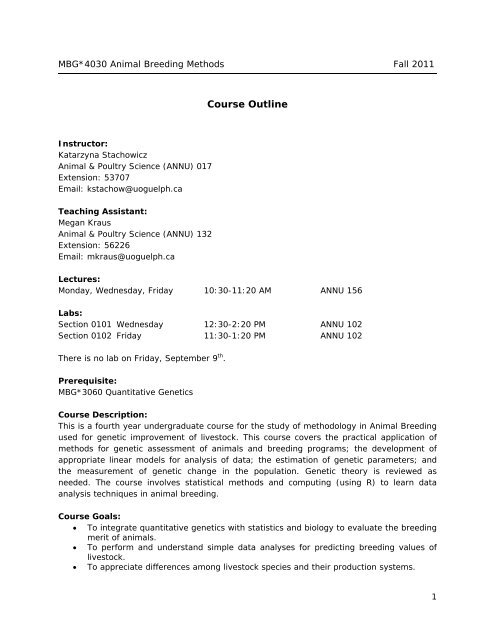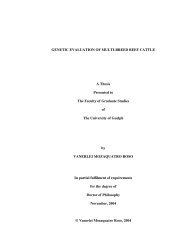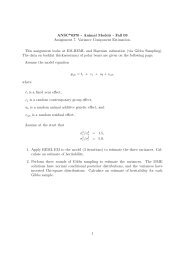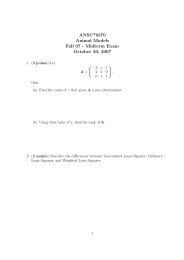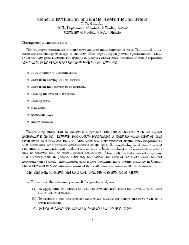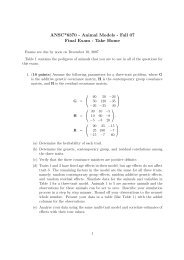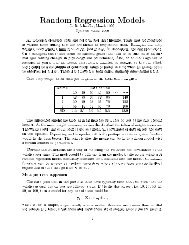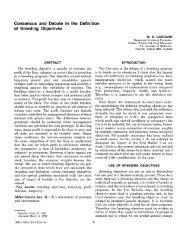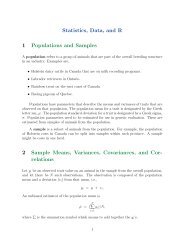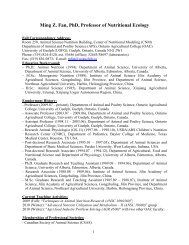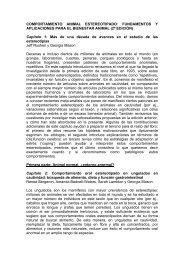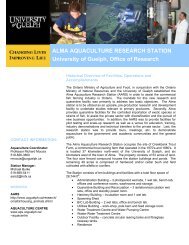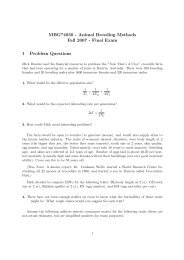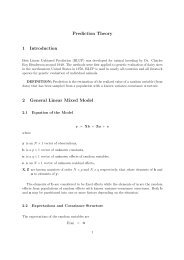MBG*4030 - Department of Animal & Poultry Science
MBG*4030 - Department of Animal & Poultry Science
MBG*4030 - Department of Animal & Poultry Science
Create successful ePaper yourself
Turn your PDF publications into a flip-book with our unique Google optimized e-Paper software.
<strong>MBG*4030</strong> <strong>Animal</strong> Breeding Methods Fall 2011<br />
Instructor:<br />
Katarzyna Stachowicz<br />
<strong>Animal</strong> & <strong>Poultry</strong> <strong>Science</strong> (ANNU) 017<br />
Extension: 53707<br />
Email: kstachow@uoguelph.ca<br />
Teaching Assistant:<br />
Megan Kraus<br />
<strong>Animal</strong> & <strong>Poultry</strong> <strong>Science</strong> (ANNU) 132<br />
Extension: 56226<br />
Email: mkraus@uoguelph.ca<br />
Course Outline<br />
Lectures:<br />
Monday, Wednesday, Friday 10:30-11:20 AM ANNU 156<br />
Labs:<br />
Section 0101 Wednesday 12:30-2:20 PM ANNU 102<br />
Section 0102 Friday 11:30-1:20 PM ANNU 102<br />
There is no lab on Friday, September 9 th .<br />
Prerequisite:<br />
MBG*3060 Quantitative Genetics<br />
Course Description:<br />
This is a fourth year undergraduate course for the study <strong>of</strong> methodology in <strong>Animal</strong> Breeding<br />
used for genetic improvement <strong>of</strong> livestock. This course covers the practical application <strong>of</strong><br />
methods for genetic assessment <strong>of</strong> animals and breeding programs; the development <strong>of</strong><br />
appropriate linear models for analysis <strong>of</strong> data; the estimation <strong>of</strong> genetic parameters; and<br />
the measurement <strong>of</strong> genetic change in the population. Genetic theory is reviewed as<br />
needed. The course involves statistical methods and computing (using R) to learn data<br />
analysis techniques in animal breeding.<br />
Course Goals:<br />
� To integrate quantitative genetics with statistics and biology to evaluate the breeding<br />
merit <strong>of</strong> animals.<br />
� To perform and understand simple data analyses for predicting breeding values <strong>of</strong><br />
livestock.<br />
� To appreciate differences among livestock species and their production systems.<br />
1
� To optimize selection and mating decisions for maximum genetic response in<br />
practical breeding schemes.<br />
� To assess the impact <strong>of</strong> new technologies in reproduction and molecular genetics on<br />
livestock improvement programs.<br />
Course Material:<br />
Notes, assignments, data sets, R scripts, old exams, etc. will be posted on CourseLink.<br />
Please consult the Links section for additional materials.<br />
Students are advised to take their own notes during lectures.<br />
Class Attendance:<br />
I will not take attendance during both lectures and labs. However, I strongly advise you to<br />
come to class, as taking your own notes will be a very important part <strong>of</strong> the learning<br />
process.<br />
Communication:<br />
� Email:<br />
Please include “<strong>MBG*4030</strong>” in the subject line.<br />
Please do not email me regarding assignments/exams/bonus project problems – use <strong>of</strong>fice<br />
hours or see me after class.<br />
� CourseLink:<br />
Please use the Discussion option on CourseLink to discuss problems with the entire class.<br />
Important messages regarding the course will be posted under the News section on<br />
CourseLink.<br />
If there is a personal problem that affects your performance in the course and/or you need<br />
to miss an exam or assignment for personal reason please contact me to make appropriate<br />
arrangements.<br />
Office Hours:<br />
By appointment, arranged through email.<br />
Important Dates:<br />
� Add period ends: September 16 th<br />
� Last day to drop one semester courses: November 3 rd<br />
� First lecture: Friday, September 9 th<br />
� Last lecture: Thursday, December 1 st (Monday schedule in effect)<br />
� Midterm: week <strong>of</strong> October 24 th (exact day, time, and place TBA)<br />
� Final Exam: Friday, December 16 th , 7:00-9:00 PM, room TBA<br />
Evaluation:<br />
Assignments 30%<br />
Midterm 30%<br />
Final Exam 40%<br />
Bonus Project up to 6 bonus<br />
2
Assignments:<br />
� Assignments will be posted on CourseLink and discussed during labs.<br />
� You will have one week to work on the assignments and hand them in during the<br />
next lab (section 0101 on Wednesdays, section 0102 on Fridays).<br />
� Marked assignments will be given back during labs the following week.<br />
� Solutions will be posted on CourseLink.<br />
� No late assignments will be accepted.<br />
� There will be 9 assignments, but only your best 8 will count for evaluation. So you<br />
may choose not to hand one <strong>of</strong> them in. However, it is in your best interest to do<br />
them all, as they reinforce concepts introduced in class and are good practice for<br />
exams.<br />
� If you miss more than one assignment for a valid reason your mark will be reweighted<br />
on the basis <strong>of</strong> those that were handed in. Otherwise, you will get mark <strong>of</strong><br />
0 for the missed one.<br />
� Most <strong>of</strong> the assignments will require the use <strong>of</strong> R s<strong>of</strong>tware (see Links at CourseLink<br />
for download).<br />
� While you are encouraged to discuss the assignment problems with fellow students,<br />
each student must hand in an individual solution which is the result <strong>of</strong> his/her own<br />
effort.<br />
Exams:<br />
� Exams will cover both lab and lecture material.<br />
� You will be allowed to bring one handwritten page with formulas you might need for<br />
the midterm and two pages for the final exam.<br />
� Calculators will be provided, you cannot use your own.<br />
� If you miss midterm for a valid reason then your final exam will be worth 70% <strong>of</strong><br />
your final grade.<br />
� The answers to old midterms and final exams will not be posted. Questions on those<br />
exams apply to that particular semester. These exams are meant to help you to<br />
prepare for your exams. Make sure you understand which topics will or will not be<br />
covered on the next exam.<br />
Bonus Project:<br />
You might choose to work on the bonus project to earn up to 6 bonus marks. The goals are<br />
to use ASReml s<strong>of</strong>tware for analysis <strong>of</strong> phenotypic records; to build the appropriate model<br />
to analyze the data; to estimate breeding values and effects for factors specified in the<br />
model; as well as to estimate variance components and heritability for traits <strong>of</strong> interest. The<br />
students which will be willing to work on this project will be given temporary accounts on<br />
the APS Linux server. Data and all other necessary materials will be provided through<br />
CourseLink. After analyzing the data you will write a short (maximum <strong>of</strong> 3 pages) summary.<br />
You can work on this project alone or in groups <strong>of</strong> up to 3 students. Further details will be<br />
discussed once the necessary concepts have been introduced in class. Bonus projects will be<br />
due on Friday, November 25 th in class.<br />
If you have an idea for another project which you would like to do in place <strong>of</strong> the above,<br />
then please discuss with me first.<br />
3


